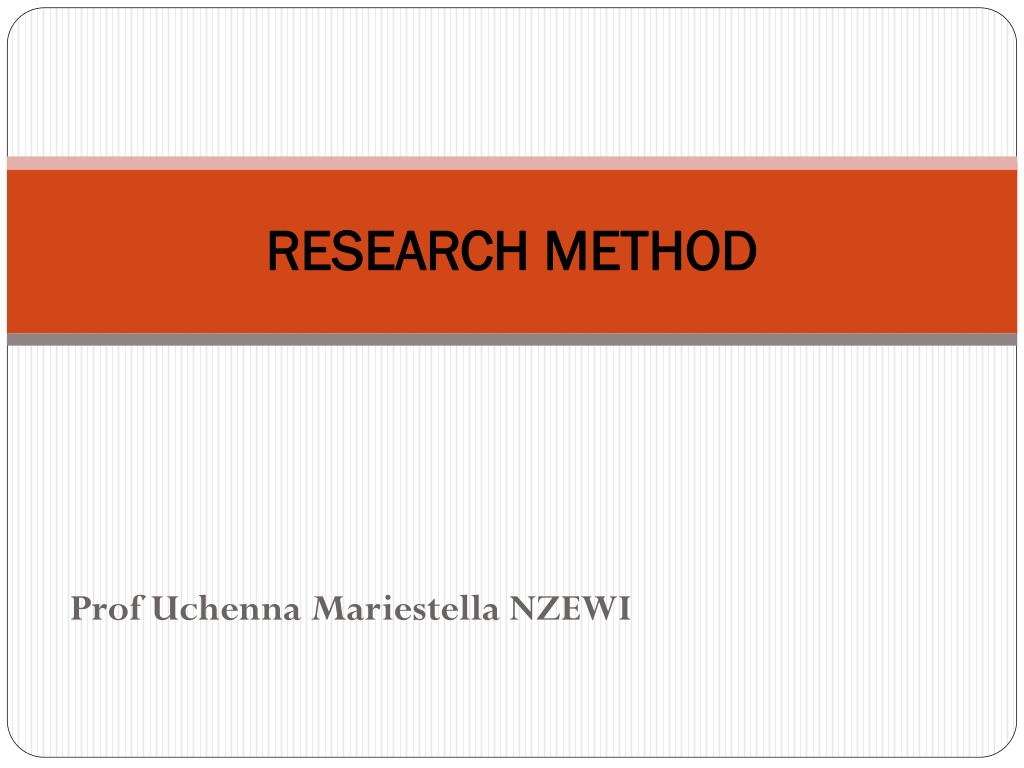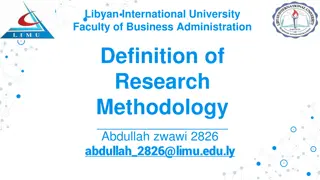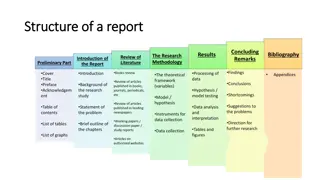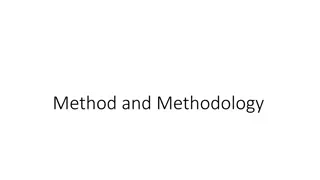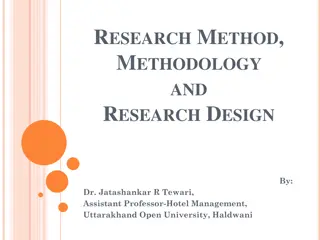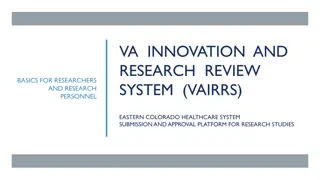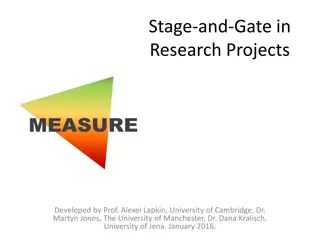Understanding Research Methods and Methodology in Academic Projects
Feeling confused or frightened about starting a research project is common, but this presentation by Prof. Uchenna Mariestella Nzewi aims to help you understand the importance of research, plan your project, and start writing effectively. Research is an organized and systematic way of finding answers to questions, aimed at solving research problems through various techniques. Research methods focus on finding solutions, while research methodology explains the methods to proceed.
- Research Methods
- Research Methodology
- Academic Projects
- Prof. Uchenna Mariestella Nzewi
- Understanding
Download Presentation

Please find below an Image/Link to download the presentation.
The content on the website is provided AS IS for your information and personal use only. It may not be sold, licensed, or shared on other websites without obtaining consent from the author. Download presentation by click this link. If you encounter any issues during the download, it is possible that the publisher has removed the file from their server.
E N D
Presentation Transcript
RESEARCH METHOD RESEARCH METHOD Prof Uchenna Mariestella NZEWI
INTRODUCTION INTRODUCTION How do you feel when it is time to carry out a research or start your project? Confused! Frightened!? Apprehensive!!?? You are not alone However >>>>> This presentation is designed to help you overcome all that by... ...helping you to understand what research is and why it is important, and...
showing you how to go about planning your own research project, ... and getting you started on the actual writing of the research project you have planned. By the time we finish going through this, you should be able to... Plan and carry out your own research projects. This presentation is intended to supplement what have learned from your coursework and reading. It will also help you get an idea of what research is if you have not taken the research methods course.
What is Research What is Research Research is an ORGANIZED and SYSTEMATIC way of FINDING ANSWERS to QUESTIONS
ORGANIZED in that there is a structure or method in going about doing research. It is a planned procedure, not a spontaneous one. It is focused and limited to a specific scope. SYSTEMATIC because there is a definite set of procedures and steps which you will follow. There are certain things in the research process which are always done in order to get the most accurate results. FINDING ANSWERS is the end of all research. Whether it is the answer to a hypothesis or even a simple question, research is successful when we find answers. Sometimes the answer is no, but it is still an answer. QUESTIONS are central to research. If there is no question, then the answer is of no use. Research is focused on relevant, useful, and important questions. Without a question, research has no focus, drive, or purpose.
Difference Between Research Methods and Research Methodology Research Methods Research Methodology The science of systematically solving a research problem The learning of the various techniques we can use in the conduct of research. The various ways and means of conducting a research that involve the conduct of experiments, tests, surveys and the like. Aims at finding solutions to research problems
The various ways and means of conducting a research that involve the conduct of experiments, tests, surveys and the like. It can be said that research methods aim at finding solutions to research problems Research methodology explains the methods by which you may proceed with your research
TYPES OF RESEARCH TYPES OF RESEARCH BASIC RESEARCH - concerned with knowledge for the sake of theory. Its design is not controlled by the practical usefulness of the findings. APPLIED RESEARCH - concerned with showing how the findings can be applied or summarized into some type of teaching methodology. PRACTICAL RESEARCH goes one step further and applies the findings of research to a specific "practical" teaching situation.
A useful way to look at the relationships among these three research types is illustrated in the diagram below. Each type contributes to the other in helping revise and frame the research from each category. For example, practical research may be based on theory that came from previously done basic research. Or, theory may be generated by the combination of results from various practical research projects. The same bidirectional relationship exists between applied research and basic research or practical research.
KINDS OF RESEARCH KINDS OF RESEARCH QUALITATIVE DESCRIPTIVE EXPERIMENTAL
QUALITATIVE RESEARCH QUALITATIVE RESEARCH This type of research goes by many names: ethnography, cognitive anthropology, etc. It tends to be synthetic rather than analytic. It attempts to capture "the big picture" and see how a multitude of variables work together in the real world. It is generally heuristic or hypothesis generating. It does not start with preconceived notions or hypotheses, attempting to discover, understand, and interpret what is happening in the research context.
DESCRIPTIVE RESEARCH DESCRIPTIVE RESEARCH This group includes many particular research methodologies and procedures, such as observations, surveys, self- reports, and tests. Descriptive research may be more analytic. It often focuses on a particular variable or factor, operates on the basis of hypotheses (often generated through previous, qualitative research), aims to gather data without any manipulation of the research context, the data collection procedures used in descriptive research may be very explicit.
Descriptive research may focus on individual subjects and go into great depth and detail in describing them. Individual variation is not only allowed for but studied. This approach is called a case-study. On the other hand, it can also investigate large groups of subjects, and because of the data collection and analysis procedures, it may be referred to as surveys.
Survey A survey is defined as a brief interview or discussion with individuals about a specific topic. survey also means to collect information Here are the three specific techniques of survey research: Questionnaires - a series of written questions a participant answers. This method gathers responses to questions that are essay or agree/neutral/disagree style. Interviews - questions posed to an individual to obtain information about him or her. This type of survey is like a job interview, with one person asking another a load of questions. Surveys - brief interviews and discussions with individuals about a specific topic. Yes, survey is also a specific type of survey, to make things even more confusing. A survey is a quick interview, with the surveyor asking only a few questions
EXPERIMENTAL RESEARCH EXPERIMENTAL RESEARCH All experimental researches have several elements in common. One of the most obvious is the division of the subjects into groups (control, experimental, etc.). Another is the use of a "treatment" (usually the independent variable) which is introduced into the research context or manipulated by the researcher. an experiment typically focuses on a specific element
Virtually all experiments are designed to test hypotheses. They attempt to control the research environment to a considerable degree They use carefully focused instruments (tests, observations, questionnaires, etc.) that generate precise quantitative data are the norm in experiments.
KINDS OF EXPERIMENTAL RESEARCH KINDS OF EXPERIMENTAL RESEARCH TRUE-EXPERIMENTAL RESEARCH QUASI-EXPERIMENTAL RESEARCH PRE-EXPERIMENTAL RESEARCH
QUASI QUASI- -EXPERIMENTAL DESIGNS EXPERIMENTAL DESIGNS QUASI-EXPERIMENTAL DESIGNS are usually based on constructions that already exist in the real world. A quasi-experimental design will have some sort of control and experimental group, but these groups probably are not randomly selected. (Random selection is usually where true-experiment and quasi-experimental designs differ.) They have greater external validity (more like real world conditions). Are much more feasible given time and logistical constraints.
RESEARCH QUESTION/PROBLEM Finding a RESEARCH QUESTION /PROBLEM is probably the most important task in the research process because the question/problem becomes the driving force behind the research-from beginning to end A research question/problem is better stated in question form. It may start out being rather general and become focused and refined later on
The research question/problem you start out with forms the basis for your review of related research literature. This general question also evolves into your hypothesis (or focused research questions). When you draw conclusions, they should address this question. In the end, the success of your research depends on how well you answer this question/or address the problem.
It is important to choose a question that satisfies certain criteria: It must not be too broad or general. It should not have already been answered by previous research (although replication with variation is acceptable). It ought to be a question that needs to be answered (i.e.,the answer will be useful to people). It must be a question that can be answered through empirical means.
Some sources to find topics or issues that can lead to research question/problem. . Personal experience Professional books Articles in professional periodicals Professional indexes Other teachers and administrators Bibliographies of various types Unpublished research by others
It is wise to focus your research so that it is "do-able." Be careful! Don't try to do too much in one study. It is, however, very possible (and quite common) to address several related research questions in one study. This approach is "economical" in that it produces more results with about the same amount of effort.
Here are some of examples: Will students learn a foreign language better when they are in a relaxed state of mind? What is the relationship between learners' ages and their accents? ? ? ? ?
LITERATURE REVIEW A Literature review is a formal survey of professional literature that is pertinent to your particular question. It enables you to find out what others have learned in relation to your question. It also helps you frame and focus your question and move you closer to the hypothesis or focused question
Once you have decided on a general research question: Read widely in that area, Use the same sources of information that you consulted when you came up with general question/problem, Narrow your focus. Look for information that relates to your research question.
HYPOTHESIS & FOCUSED QUESTION HYPOTHESIS & FOCUSED QUESTION - a tentative statement about the relationship between two or more variables. - focused statement(s) which predicts an answer to your research question. - based on the findings of previous research (gained from review of the literature) and perhaps previous experience with the subject.
Forms of Hypothesis Forms of Hypothesis Research: Used mainly in qualitative studies Statistical: Used mainly in quantitative studies, contain statistical parameters e.g. mean, correlation coefficient etc., and are of two forms NULL which proposes that there is no relationship between two measured phenomena, and ALTERNATIVE which asserts that a relationship exists.
Examples of Hypothesis Examples of Hypothesis Alternative: The "Bowen technique" will significantly improve intermediate-level, college-age ESL students' accuracy when pronouncing voiced and voiceless consonants and tense and lax vowels. Null: The Bowen technique will have no significant effect on learners' pronunciation.
Examples of Hypothesis Examples of Hypothesis Research: Senior secondary school girls will achieve higher than senior secondary school boys in Maths Statistical /Null: there will be no significant difference(p<0.05) between the mean achievement scores of senior secondary school girls and senior secondary school boys in Maths
FOCUSED RESEARCH QUESTION FOCUSED RESEARCH QUESTION In some research, a hypothesis is not necessary Focus and structure is still critical, therefore a Focused research question is used. Example: Is a contrastive presentation (showing both native and target cultures) more effective than a non-contrastive presentation (showing only the target culture) in helping students understand the target culture?
VARIABLES VARIABLES AVARIABLE is a measurable characteristic that varies. It may change from group to group, person to person, or even within one person over time Examples: Age, score, ability, .. There are six common variable types
DEPENDENT VARIABLES: show the effect of manipulating or introducing the independent variables e.g. scores, achievement, interest, INDEPENDENT VARIABLES: The variables that the researcher has control over e.g. methods of instruction. INTERVENING VARIABLES: abstract processes that are not directly observable but link the independent and dependent variables , e.g. students mood MODERATOR VARIABLES: affect the relationship between the independent and dependent variables by modifying the effect of the intervening variable(s). These may be taken into consideration in a study e.g. age, sex, culture . CONTROL VARIABLES: the variables that are not measured in a particular study and are held constant to prevent their interfering with the outcomes of a study e.g. class environment EXTRANEOUS VARIABLES: those factors in the research environment which may have an effect on the dependent variable(s) but which are not controlled. They may damage a study's validity, making it impossible to know whether the effects were caused by the independent and moderator variables or some extraneous factor e.g. sudden illness of study subjects
DATA: They are a representation of reality, and show the results of measuring properties or processes TYPES NOMINAL DATA : places things into named categoriese.g man and woman ORDINAL DATA: places things in order e.g. 1st, 2nd, 3rd INTERVAL DATA: scale uses equal-sized units of measurement, shows the distances, or intervals, between subjects' performances has no absolute zero RATIO DATA: The ratio scale is like the interval scale. It employs equal intervals. However, the ratio scale begins at a true zero point. Can be further manipulated mathematically unlike other forms of data.
STUDY SUBJECTS SUBJECTS are the sources of your data. Most research in humanities use people as subjects. Their characteristics, development, opinions, attitudes, knowledge, performance, etc. are used to answer your research question, Involves determination of appropriate POPULATION and SAMPLE
POPULATION and SAMPLE POPULATION is the group from which your subjects are drawn. Therefore, it is also the group that your subjects represent. SAMPLE: This is a smaller group drawn from the population using a predetermined process known as SAMPLING TECHNIQUE
SAMPLING TECHNIQUES The common ones include SIMPLE RANDOM SAMPLING STRATIFIED RANDOM SAMPLING PRPORTIONATE RANDOM SAMPLING PURPOSIVE SAMPLING
INSTRUMENTS FOR DATA COLLECTION The purpose of the instrument is to elicit the data for a study. Can be tests,checklists, questionnaire, inventories, observations, diaries, school records, or . Can be developed by the researcher or adapted from existing ones.
VALIDITY In general,VALIDITY is an indication of how sound your research is. More specifically, validity applies to both the design and the methods used in the research. Validity in data collection means that the findings truly represent the phenomenon claimed to be measured. Two main types: INTERNAL and EXTERNAL
INTERNAL VALIDITY Flaws within the study itself - such as not controlling some of the major variables (a design problem), or problems with the research instrument (a data collection problem). Factors affecting Internal validity 1. Subject variability 3. Time given for the data collection or experimental treatment 4. History 5. Attrition 6. Maturation 7. Instrument/task sensitivity 2. Size of subject population
EXTERNAL VALIDITY The extent to which findings can be generalized to a larger group or other contexts e.g. if the subjects are all males from one ethnic group, the findings might not apply to females or other ethnic groups Factors affect external validity 1. Population characteristics (subjects) 2. Interaction of subject selection and research 3. Descriptive explicitness of the independent variable 4. The effect of the research environment 5. Researcher or experimenter effects 6. Data collection methodology 7. Time
DATA ANALYSIS and RESULT PRESENTATION DATA ANALYSIS Descriptive statistics: Mean, Median, Frequency, Standard Deviation, etc Inferential statistics Independent t-test, one way ANOVA, ANCOVA, RESULT RESENTATION Tables Figures Graphs Bar chart Pie chart etc
WRITING IT UP FORMAT TYPICALLY CONSISTS OF FIVE MAJOR SECTIONS (There are exceptions departmental/faculty) INTRODUCTION: Rationale background/significance; Purpose; Research question(s) LITERATURE REVIEW DESIGN & METHOD RESULTS CONCLUSION Some research reports end (or begin) with an abstract. An abstract is a highly abbreviated (usually 100-200 words) synopsis of your research.
REFERENCE AND BIBLIOGRAPHY Reference This is a compilation of all those materials that were consulted and cited directly in the body of a write up (project) Bibliography This is a compilation of all sources consulted while writing something, but these may not have been cited in the write up
In In- -text citation and References text citation and References Examples .
QUESTIONS AND DISCUSSIONS QUESTIONS AND DISCUSSIONS
RESOURCES RESOURCES http://linguistics.byu.edu/faculty/henrichsenl/Re searchMethods/RM_0_01.html http://www.apastyle.org/learn/faqs/web-page- no-author.aspx) Cooper, H. (2016).Ethical choices in research: Managing data, writing reports, and publishing results in the social sciences.Washington, DC: American Psychological Association. Retrieved from http://www.apa.org/pubs/books/4312023.aspx
Ezeh, D.N (2011) Writing Research Proposal and Report without tears. Enugu, Timex Enterprises.
CONTINUE.....>> THE LEARNING LET
THANK YOU FOR YOUR ATTENTION!!! ======================= Professor Uchenna Mariestella NZEWI Professor of Science Education and Dean, School of General Studies University of Nigeria, Nsukka uchenna.nzewi@unn.edu.ng
